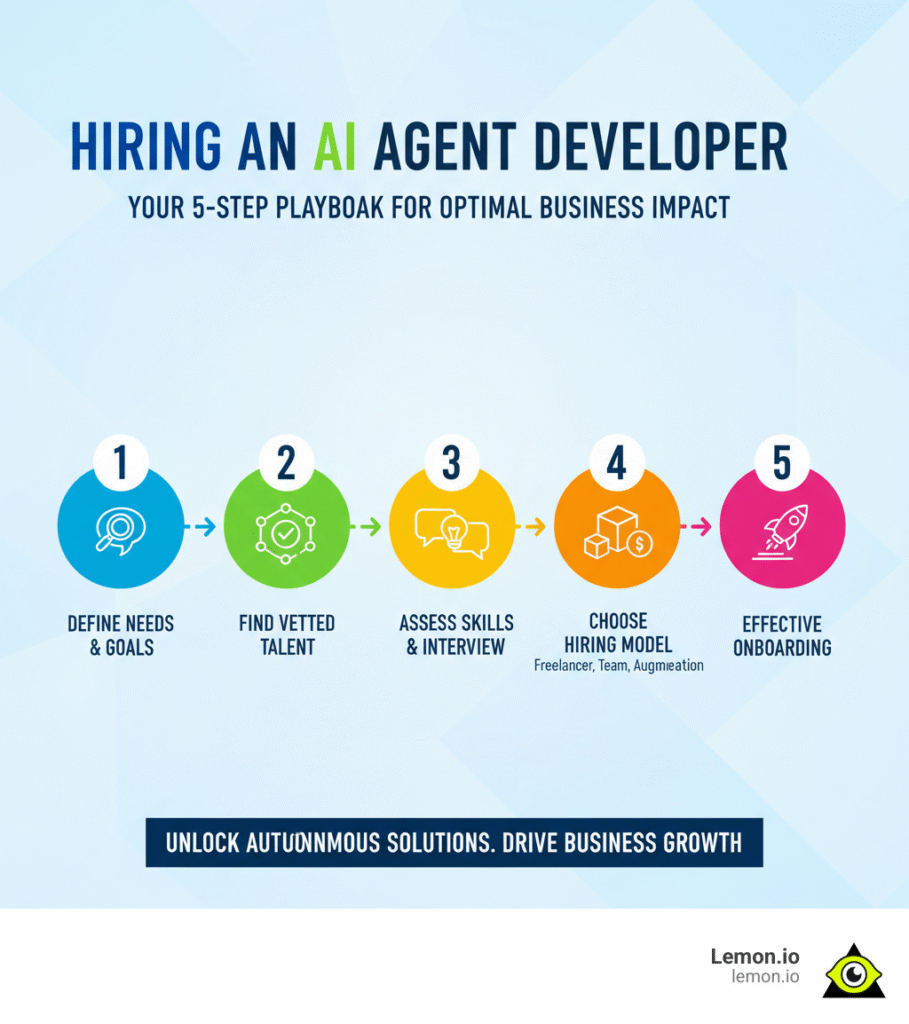If you’re looking to hire an AI agent developer, here’s a quick guide on the essential steps:
- Define Your Needs: Clearly outline your project goals and the specific tasks you want the AI agent to perform.
- Find Vetted Talent: Look for developers on specialized platforms that pre-screen for AI expertise.
- Assess Skills: Conduct interviews and technical evaluations to confirm their experience with AI agent frameworks.
- Choose a Model: Decide if you need a freelancer, a dedicated team, or staff augmentation.
- Onboard Effectively: Integrate your new developer smoothly and set clear expectations for success.
AI agents are smart software programs that act on their own. They analyze data, make decisions, and complete tasks without constant human input. This helps businesses run much smoother and find new ways to grow.
The global AI market shows just how powerful these tools are. It’s expected to grow at a huge rate of 35.9% from 2025 to 2030. To use this power for your business, you need expert AI agent developers. They build the intelligent systems that can transform your operations.
I’m Aleksandr Volodarsky. My experience includes scaling Lemon.io from $2.7 million to $10 million in 2021, a journey that deeply involved understanding how to successfully hire AI agent developer talent for rapid growth. This guide will walk you through everything you need to know.

Understanding the AI Agent Developer Role

The world of AI is truly buzzing, and it’s easy to feel a bit lost in all the new terms flying around. But let’s simplify things: when we talk about AI agents, we’re stepping into something truly exciting. We’re talking about smart software that acts on its own. These aren’t just simple scripts; they’re designed to make decisions, tackle tasks, and work with their environment, almost like a super-efficient digital helper.
Think about it this way: a basic script just follows a rigid set of rules you give it. A chatbot can answer questions, but usually only from a pre-set list. An AI agent, however, is different. It can understand what’s going on, learn from every interaction, adjust to new situations, and even plan its own steps to reach a goal. This is where businesses find real magic for growth and innovation!
AI agents are changing how companies get things done. They’re not just about saving a buck; they’re about open uping amazing levels of efficiency, making things super accurate, and offering truly personalized experiences. By taking over tasks that are repetitive but still complex, these agents free up your team to focus on bigger, more creative ideas. This leads to big savings and a massive boost in how productive everyone can be. For example, some companies have seen AI developers help cut manual work by as much as 80% for tasks like managing investment data. Now that’s a serious win for your bottom line!
What is an AI agent developer?
So, who are these wizards behind the curtain? An AI agent developer is a special kind of software expert. They’re the ones who design, build, and launch these intelligent, self-sufficient systems. They’re at the very edge of bringing artificial intelligence to life, crafting software that can think and act. This means software that can analyze information, understand what you’re saying, spot patterns, solve problems, and make smart choices. Simply put, these developers don’t just write code; they build digital brains that give software purpose and autonomy.
Unlike general AI or machine learning developers who might focus on training models or setting up data, an AI agent developer’s main goal is to create systems that can act independently to hit specific targets. They know that an AI agent is much more than just a clever chatbot. It’s a goal-oriented entity. These can be anything from reactive agents that respond instantly to things happening around them, to learning agents that get better and smarter over time with experience. Their unique skill is knowing how to blend different AI technologies into one smooth, purpose-driven system. Want to dive deeper into what artificial intelligence truly means? You can check out this explanation.
Core Responsibilities and Business Impact
The job of an AI agent developer is incredibly varied and makes a huge difference. They do a lot more than just code.
First, they’re experts at designing agent architecture. This is like drawing the blueprint for how the agent will “see” its world, make decisions, and take action. It needs careful planning to make sure the agent is strong and can grow with your business. Then, they focus on integrating Large Language Models (LLMs). This means hooking up powerful models like GPT-4 or Gemini. These LLMs help agents understand language naturally and even create their own text, allowing them to communicate and think effectively.
Next, it’s all about developing agent skills. They give the agent specific abilities, whether it’s searching the web, pulling out key data, making calls to other software through APIs, or even transcribing videos. They often use existing AI tools and integrations for this. They also handle data processing and management, dealing with huge amounts of information needed for training, understanding context, and making decisions. They make sure the data is good quality and easy to find.
Crucially, they master API integration. This means connecting the AI agent with all sorts of other business systems – like your customer relationship management (CRM), enterprise resource planning (ERP), or databases. This allows the agent to actually do things in the real world. Finally, they’re responsible for system monitoring and optimization. They keep an eye on the agent to make sure it’s always working well, efficiently, and accurately, constantly tweaking its behavior to get the best results.
The business benefits of these tasks are huge! By having AI agents handle things that often take a lot of time, are repetitive, or need complex data work, these professionals directly help your business by:
- Reducing Manual Work: As we talked about, AI agents can drastically cut down the need for people to do routine tasks.
- Improving Customer Experience: They offer instant, personalized, and consistent support, 24/7.
- Accelerating Decision-Making: They can sift through massive amounts of data and give you clear insights much faster than any human team could.
- Driving Innovation: This frees up your human team to focus on creative problem-solving and developing exciting new products and services.
Common Use Cases for AI Agents
The ways you can use AI agents are growing every single day. Here are some common examples where a skilled AI agent developer can truly make a difference for your business:
- Customer Support Automation: Think of AI chatbots and virtual assistants that answer questions right away, provide quick solutions, and send harder issues to a human when needed.
- Sales Assistance and Lead Qualification: AI agents can chat with potential customers, figure out which leads are promising, answer questions about products, and even send automated follow-up messages.
- Data Analysis and Reporting: Agents can gather, process, and summarize huge piles of data, creating daily reports or spotting market trends automatically.
- Content Creation: They can draft articles, social media posts, marketing messages, or even personalized emails to save you time.
- Supply Chain Optimization: Monitoring stock levels, predicting what customers will want, and making logistics smarter to cut costs and work more smoothly.
- Fraud Detection: They can find unusual patterns in transactions or data to flag potential fraud in real-time, protecting your business.
- Personalized Recommendations: Powering the “you might also like” sections on e-commerce sites, streaming platforms, or service providers, making suggestions just for you.
- IT Operations: Watching over computer systems, finding problems before they get big, and even fixing common IT issues all by themselves.
- Healthcare Support: Helping with patient screenings, scheduling appointments, and giving out important health information.
Essential Skills and Technologies for AI Agent Developers

When you’re ready to hire an AI agent developer, you’re not just looking for someone who can spell “artificial intelligence” correctly. You need a developer who combines deep technical skills with the right mindset to build systems that actually work in the real world.
Think of it like hiring a chef. They need to know how to use a knife and understand flavor profiles. But the best chefs also understand their diners, can adapt recipes on the fly, and work well under pressure. AI agent developers are similar – they need both the technical chops and the human skills to create something truly valuable.
Must-Have Technical Skills
The foundation of any great AI agent developer starts with Python proficiency. This isn’t negotiable – Python is the language that powers most AI development today. It’s like asking a carpenter to work without a hammer.
But Python is just the beginning. Your developer needs to be comfortable with the major AI frameworks. TensorFlow and PyTorch are the heavy hitters here. These frameworks let developers build, train, and deploy the machine learning models that power AI agents. Without these skills, they’re essentially trying to build a car without understanding engines.
Here’s where things get interesting for AI agents specifically. LangChain has become essential for developers working with large language models. It’s the toolkit that helps orchestrate complex AI behaviors and chain different AI operations together. Think of it as the conductor that helps all the AI instruments play in harmony.
LlamaIndex is another crucial tool, especially when your AI agent needs to work with external data sources. This is what makes Retrieval-Augmented Generation (RAG) possible – allowing your agent to pull in fresh, relevant information rather than being limited to its training data.
Your developer should also have hands-on experience with Hugging Face. This platform has become the go-to resource for pre-trained models and AI tools. It’s like having access to a massive library of AI components that can speed up development significantly.
Direct experience with the OpenAI API is increasingly valuable too. Many businesses want to leverage GPT-4 and other cutting-edge models, so knowing how to integrate and fine-tune these models is a real advantage.
Don’t forget about vector databases. As AI agents become more sophisticated, they need efficient ways to store and retrieve information based on meaning rather than exact matches. Tools like Pinecone, ChromaDB, and Weaviate are becoming standard parts of the toolkit.
Cloud platform experience is non-negotiable. Whether it’s AWS, Google Cloud, or Azure, your developer needs to understand how to deploy and scale AI systems in the cloud. Building an AI agent that only works on a laptop isn’t going to help your business.
Finally, API development and integration skills are crucial. AI agents rarely work in isolation – they need to connect with your existing systems, databases, and third-party services. Your developer should be comfortable both building APIs and integrating with external ones.
Key Machine Learning Concepts
Technical tools are important, but understanding the underlying concepts is what separates good developers from great ones. Your ideal candidate should have a solid grasp of machine learning models and know when to use different types for different problems.
Deep learning knowledge is essential, especially understanding neural networks and how they learn from data. This isn’t just academic knowledge – it’s practical understanding of how to build systems that can recognize patterns and make decisions.
Natural language processing (NLP) is particularly important for AI agents that interact with humans. Your developer needs to understand how computers can process and generate human language effectively.
RAG (Retrieval-Augmented Generation) deserves special mention because it’s become so important for modern AI agents. This technique allows agents to access external knowledge bases and provide more accurate, up-to-date information. It’s the difference between an agent that’s stuck with outdated training data and one that can access fresh information.
Model fine-tuning skills are also valuable. This is the ability to take a pre-trained model and adapt it for your specific business needs. It’s like taking a general-purpose tool and customizing it perfectly for your particular job.
Crucial Soft Skills
Here’s where many companies make a mistake. They focus so much on technical skills that they forget about the human side of the equation. The best AI agent developers combine technical expertise with strong soft skills.
Problem-solving is absolutely critical. AI projects often venture into uncharted territory where there’s no clear playbook. Your developer needs to be comfortable with ambiguity and skilled at breaking down complex problems into manageable pieces.
Critical thinking goes hand in hand with problem-solving. Your developer should be able to evaluate different approaches, anticipate potential issues, and make sound technical decisions even when the stakes are high.
Communication skills might seem less important for a technical role, but they’re actually crucial. Your developer will need to explain complex AI concepts to non-technical stakeholders, collaborate with team members, and document their work clearly. The best technical solution in the world is useless if no one understands how to use it.
Adaptability is essential in the fast-moving world of AI. New tools, techniques, and best practices emerge regularly. Your developer needs to be genuinely excited about learning and comfortable with the fact that their toolkit will keep evolving.
Business acumen is what separates developers who build cool demos from those who build solutions that actually drive business value. Understanding your company’s goals, constraints, and success metrics helps them make better technical decisions.
Finally, collaboration skills matter more than you might think. AI projects typically involve multiple stakeholders – from data scientists to product managers to end users. Your developer needs to work well with others and integrate smoothly into your existing workflows.
When you hire an AI agent developer, you’re looking for this complete package. The technical skills get them in the door, but it’s the combination of technical expertise and soft skills that makes them truly valuable to your business.
The Hiring Playbook: How to Hire an AI Agent Developer
Finding the right AI agent developer doesn’t have to feel overwhelming. With the right approach, you can steer this process smoothly and land the talent that will transform your business. Let me walk you through our proven playbook that’s helped countless companies find their perfect match.
Step 1: Define Your Project and Write a Compelling Job Description
Before you start interviewing anyone, you need crystal-clear vision of what you want your AI agent to accomplish. This clarity becomes your North Star throughout the entire hiring journey.
Start by defining your business goals with specific, measurable outcomes. Instead of saying “improve customer service,” aim for something like “reduce customer service response times by 30%” or “automate 50% of our data entry tasks.” These concrete targets help you find developers who understand real business impact.
Next, outline your project scope in detail. What core functionalities will your agent need? Which systems must it integrate with? What data sources will it use? The more specific you are here, the better candidates can assess if they’re the right fit for your needs.
When listing key responsibilities, think about the day-to-day work. Will this developer be designing AI agent architecture from scratch? Integrating with your existing CRM via API? Fine-tuning language models for your industry’s specific terminology? These details attract developers with relevant experience.
Specify required skills by distinguishing between “must-have” and “nice-to-have” qualifications. Refer back to our essential skills section, but be realistic about what you truly need versus what would be a bonus.
Don’t forget cultural fit considerations. Does your team work independently or collaborate closely? Are you looking for someone who thrives in a startup environment or prefers structured processes? These factors matter just as much as technical skills.
Your job description should tell a compelling story about the role’s impact, not just list technologies. Explain the why behind the position and how it fits into your bigger vision.
Step 2: Find and Vet Qualified Candidates
The secret to hiring great AI agent developers lies in knowing where to look and having a solid vetting process. Not all talent sources are created equal.
Specialized platforms like Lemon.io focus specifically on connecting businesses with top-tier developers. We pride ourselves on our rigorous 100% manual vetting process that ensures you get access to the top 1% of talent. This saves you countless hours of sifting through unqualified candidates.
General freelance marketplaces can offer a wide range of options, though the quality varies significantly. If you go this route, be prepared to invest more time in the screening process.
Professional networks and industry-specific AI communities can be goldmines for senior talent, especially when you’re looking for someone with deep expertise in your specific domain.
Our vetting process (and what you should look for elsewhere) goes far beyond resume screening. We assess candidates’ overall profiles, including their portfolios, past projects, and contributions to open-source initiatives. We look for practical outcomes and real-world impact, not just impressive-sounding job titles.
Technical assessments are crucial. These might include coding challenges or live coding sessions that evaluate problem-solving abilities and proficiency in relevant languages and frameworks. For AI agent developers specifically, we test experience with AI agent frameworks like LangChain, LLM integration capabilities, and familiarity with relevant use cases.
Behavioral interviews help us assess soft skills like communication, critical thinking, and adaptability. These qualities are especially important for remote roles where clear communication can make or break a project’s success.
Step 3: Conduct a Structured Interview
A well-structured interview process ensures you’re consistently evaluating candidates and asking the right questions to make informed decisions.
Behavioral questions reveal how candidates handle real-world challenges. Try asking about a time they faced a significant obstacle in an AI project and how they overcame it. Ask how they stay current with rapidly evolving AI and LLM advancements. Understanding their ideal working environment and collaboration style helps you gauge team fit.
Technical questions should dive deep into their expertise. Have them explain the difference between reactive agents and goal-based agents. Ask about their approach to fine-tuning LLMs for specific industry datasets. Request a walkthrough of a typical AI agent architecture they’ve designed. Explore the trade-offs they consider when choosing between proprietary models like GPT-4 versus open-source alternatives like LLaMA.
Project-based discussions often reveal the most about a candidate’s capabilities. Ask them to detail an AI agent project they’re particularly proud of, including their specific role, challenges faced, and measurable outcomes. Understanding how they measured performance and ROI shows business acumen.
Problem-solving assessments work well when you present a hypothetical scenario relevant to your project and ask candidates to outline their approach. This reveals both technical thinking and communication skills.
Culture fit evaluation is just as important as technical competency. The most skilled developer won’t succeed if they can’t work effectively within your team’s dynamics and values.
Step 4: Compare Hiring Models and Costs
The cost to hire an AI agent developer varies significantly based on your chosen model, location, and experience level. Understanding these options helps you make the best decision for your specific situation.
Hiring Model |
Description |
Pros & Cons |
Typical Costs |
|---|---|---|---|
Freelance |
Individual contractors hired for specific projects or tasks, often working remotely |
Pros: Cost-effective, flexible, quick access to specialized talent for short-term projects |
Cons: Limited availability, potential communication challenges, less integration with your team |
Staff Augmentation |
Experienced developers who integrate into your existing team structure for extended periods |
Pros: Seamless team integration, dedicated focus on your projects, easier communication and collaboration |
Cons: Higher cost than freelancers, longer-term commitment required |
Dedicated Team |
A full-time, integrated team working exclusively on your AI initiatives |
Pros: Complete dedication to your project, deep understanding of your business, consistent availability and communication |
Cons: Highest upfront investment, best suited for larger, ongoing projects |
Freelance rates typically range from $60-100+ per hour for experienced AI developers, though top-tier specialists can command $150+ per hour. Full-time salaries for AI agent developers often start around $150k+ annually in major tech markets, with senior developers earning significantly more.
Location impact remains significant. Developers in Eastern Europe, Latin America, and parts of Asia often provide excellent value while maintaining high quality standards. Experience level and project complexity also heavily influence pricing.
The key is matching your hiring model to your project needs, timeline, and budget constraints. Short-term proof-of-concept projects might work well with freelancers, while complex, ongoing AI initiatives often benefit from dedicated team arrangements.









